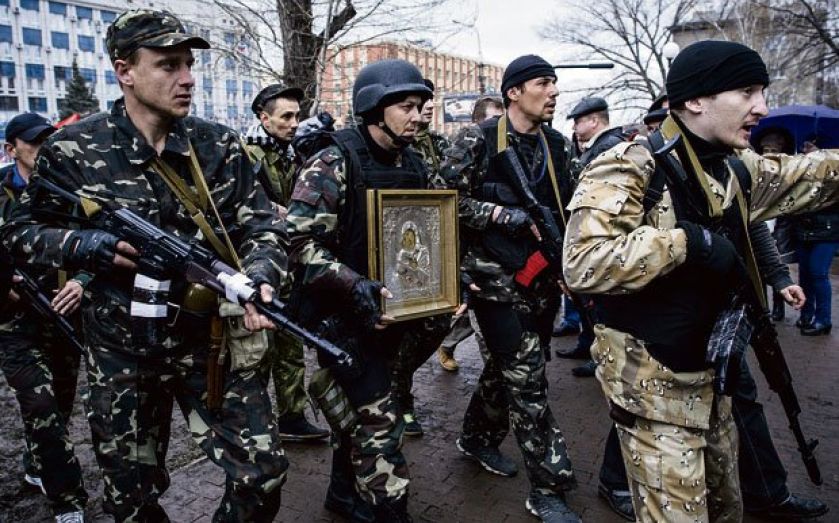How the West’s utopians damned Ukraine to Russian dominance

THERE is little doubt that Ukraine stands perilously on the edge of disaster, if not full invasion, as Russian troops assemble on its borders and pro-Russian activists violently demonstrate in key eastern cities.
So why, in response, has the West floundered? There is a critical division between the major western foreign policy schools of thought that can be conveyed quite simply. Utopians – such as right-wing American neocons and left-wing Wilsonians (in power across much of continental Europe) – obsess about the fact that the world is not the way it should be. Realists, meanwhile, worry about the world as it is. This leaves utopians at a distinct analytical disadvantage, as the world never seems to behave as they hope and expect it will. But if the world is to be made better, it must be understood, warts and all.
The Ukraine crisis has been merely the latest in a long line of utopian disappointments, as President Putin resolutely refuses to act as Wilsonians would like him to. In the end, hapless secretary of state John Kerry has been left to sneer that Putin’s dark realism is a throw-back to nineteenth century power politics, having no place in a twenty-first century that has evidently outgrown all of mankind’s foibles. It is Putin who is an aberration, not the worthy analysis of Washington and so many other European capitals. Such bedtime stories do little to advance an understanding of what the Russian President is up to.
The first step down this analytical road is to have humility about the West’s past mistakes. As the protests in Ukraine began to swell, the Kremlin made it crystal clear that, while it was open to Kiev having marginally closer ties to Europe, it opposed Ukraine decisively emerging as a full member of the Euro-Atlantic community, anchored into some sort of enduring partnership with either Nato or the European Union.
But as the Wilsonians inherently reject the very notion of spheres of influence (Russia, China, India, and Brazil to the contrary), Russian arguments were airily dismissed. Instead, they piously intoned that Kiev was entitled to decide on its own who it wished to be allies with, as though Mexico has that option.
Even worse, this ludicrously otherworldly view – betraying a total ignorance of the realities of geopolitics – was coupled with practical indifference. Because Ukraine was a primary Russian interest, Putin was prepared to risk a lot to achieve an end state wherein Kiev remained within the Russian sphere of influence. Precisely because Ukraine is not a primary western interest, Europe and America were not – even in terms of economic sanctions, let alone (blessedly) a military response. To see the crisis as it is means accepting the notion that interests primarily guide a state’s foreign policy. And crucially, neither the lion’s share of European nor American policymakers – utopians as they are – could possibly do this.
If realism explains the crisis up until now, what will happen next, given Russian-inspired provocations in eastern Ukraine? Here a more federal Ukraine – an option being floated by the current interim Ukrainian government – is the last, best hope to avert invasion. A weak, federal, but unitary Ukrainian state, with the east and south of the country practically dominated by Moscow but not directly invaded, is about the best the West can hope for.
Even this unhappy outcome – still the best of a series of bad options – may not be achievable, as Russian troops mass on the Ukrainian border. But either way, Ukraine will undoubtedly remain within the Russian sphere of influence, however much Wilsonians refuse to accept that such things exist.
But this does not mean the West can and should do nothing over the long term. For any objective realist assessment of the relative power of an economically-fading Kremlin and the West makes clear who ought to win this contest over the long run. Russia needs the price of oil to be roughly $110 a barrel to balance its budget; it is already falling south of that, with long-term futures markets pointing to prices heading to well under $100.
The US and Europe should do everything in their power to see that this happens, from lifting the ban on the export of American oil to encouraging the Poles and British to open up the shale industry. If this comes to pass, Putin’s days will be numbered, and the primacy of the present international order will be upheld. But to do this will take time, commitment, and a coherent western energy strategy. May this ethical form of realism come to save the intellectually floundering West.
Dr John C Hulsman is senior columnist at City A.M., and president and co-founder of John C Hulsman Enterprises (www.john-hulsman.com), a global political risk consultancy. He is a life member of the Council on Foreign Relations, and author of Ethical Realism, The Godfather Doctrine, and most recently Lawrence of Arabia, To Begin the World Over Again.